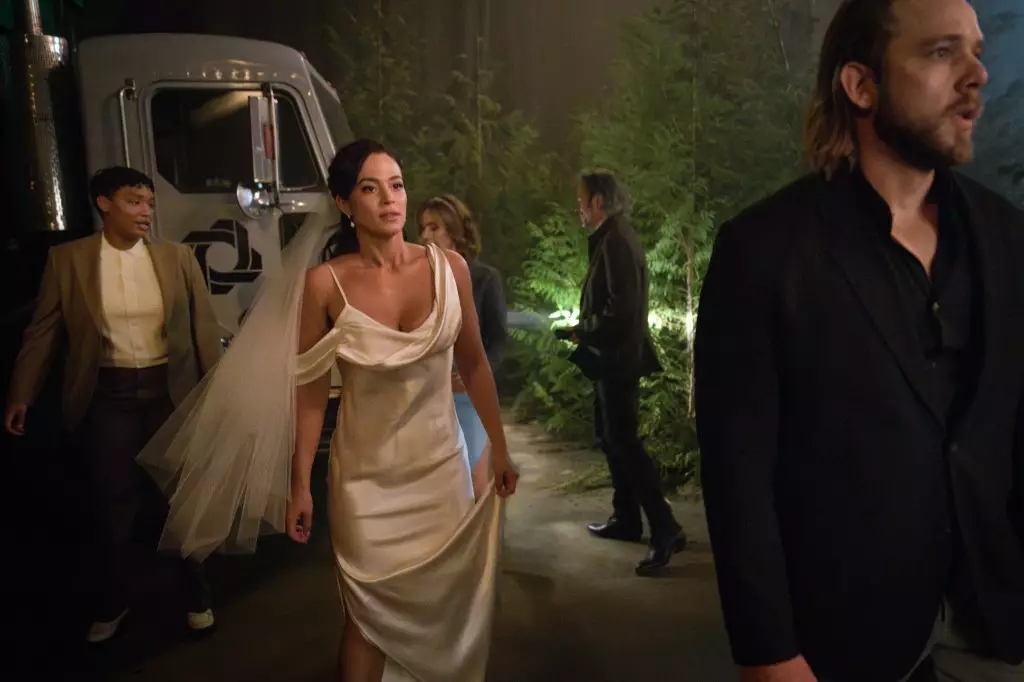The season premiere of “Fire Country,” titled “What the Bride Said,” has sparked conversations among viewers, igniting their enthusiasm and curiosity. With an unexpected helicopter crash interrupting a significant wedding, the show intertwined chaos with its core themes of resilience and community. However, while the dramatic incidents may steal the spotlight, the deeper narrative continues to unravel intricate relationships and character development that lay at the heart of this series.
In a dramatic twist that few could have predicted, the wedding of Diego and Gabriela is tragically overshadowed by a helicopter crash. This unforeseen event serves as a catalyst for action, where wedding attendees quickly transform from celebrators to first responders. This bold move not only escalates the tension but also illuminates the core of the show: the strength of community during crises. The scene is a metaphor for life itself—filled with aspirations and celebration, yet interspersed with unpredictable turmoil. This duality resonates throughout the series, reflecting a delicate balance between joy and chaos.
Tia Napolitano, the showrunner, designed this chaotic moment to engage viewers. After brainstorming several potential scenarios, the decision to include a helicopter crash deviates from traditional wedding tropes, showcasing the underlying theme of the show: unexpected challenges demand courage and teamwork. Additionally, the bold choice of character responses highlights the extraordinary capabilities of ordinary citizens when thrust into emergency situations, leaving viewers with an adrenaline rush.
The character of Gabriela, played by Stephanie Arcila, is notably impactful during the calamity. Clad in her wedding attire, she springs into action to aid those injured in the crash, presenting a compelling image of heroism against societal expectations. Critics could argue that such a scene stretches the bounds of realism, as a bride typically does not expect to don a superhero’s mantle on her wedding day. However, her willingness to disregard her dress in favor of saving lives speaks volumes about her character’s strength and commitment to their community.
Napolitano acknowledges the initial absurdity of this scenario but emphasizes that the characters are acting as civilians, not as formally trained firefighters. This subtlety is pivotal as it allows the story to explore the innate heroism in everyone, blurring the lines between professional duties and human instincts during crises. Gabriela’s actions become more than a spectacle; they embody the spirit of engendering hope and proactive solidarity in adversity.
One cannot overlook the underlying tensions stemming from familial relationships, particularly between Manny, Gabriela’s father, and Bode, portrayed by Max Thieriot. Manny’s protective instincts towards his daughter illuminate a complex narrative surrounding love, trust, and fear. His concerns about Gabriela’s connection to Bode echo unresolved issues from his past. The fear that their relationship may mimic his own flawed union paints Manny as an emotionally layered character, grappling with the specter of his daughter potentially repeating history.
The exploration of familial legacies is an essential theme in this season’s narrative arc, as emphasized by Napolitano. Bode’s journey to embrace his identity as part of the Leone firefighting tradition propels his character development forward. As he shifts from a reluctant participant to someone eager to honor his family’s legacy, viewers are invited to witness his struggles with internal conflict and emotional growth. This evolving narrative enriches not only Bode’s character but also opens pathways for exploring other significant relationships within the series.
Fire Country’s ambitious storytelling extends beyond mere chaos and intrigue, with characters facing the consequences of their choices head-on. The two-part premiere captures the essence of what lies ahead, promising deeper explorations into personal legacies and relationships. With the introduction of new characters, like Captain Casey portrayed by Jared Padalecki, interesting dynamics emerge, potentially leading to unforeseen alliances and rivalries that keep viewers on the edge of their seats.
The collaborative dynamics between the rotating guest and main cast signal a broader universe rich with interconnected stories. As spinoffs like Sheriff Country loom on the horizon, the foundation laid in this premiere hints at a multiverse of characters, each contributing to the overall narrative depth.
“What the Bride Said” serves not only as an exhilarating opener for Season 3 of Fire Country but also as a profound statement on the intersections of love, legacy, and the human spirit in the face of adversity. Its artful fusion of unexpected crises with deep emotional narratives challenges viewers to engage critically with both the characters and the broader themes of community, resilience, and personal growth.

